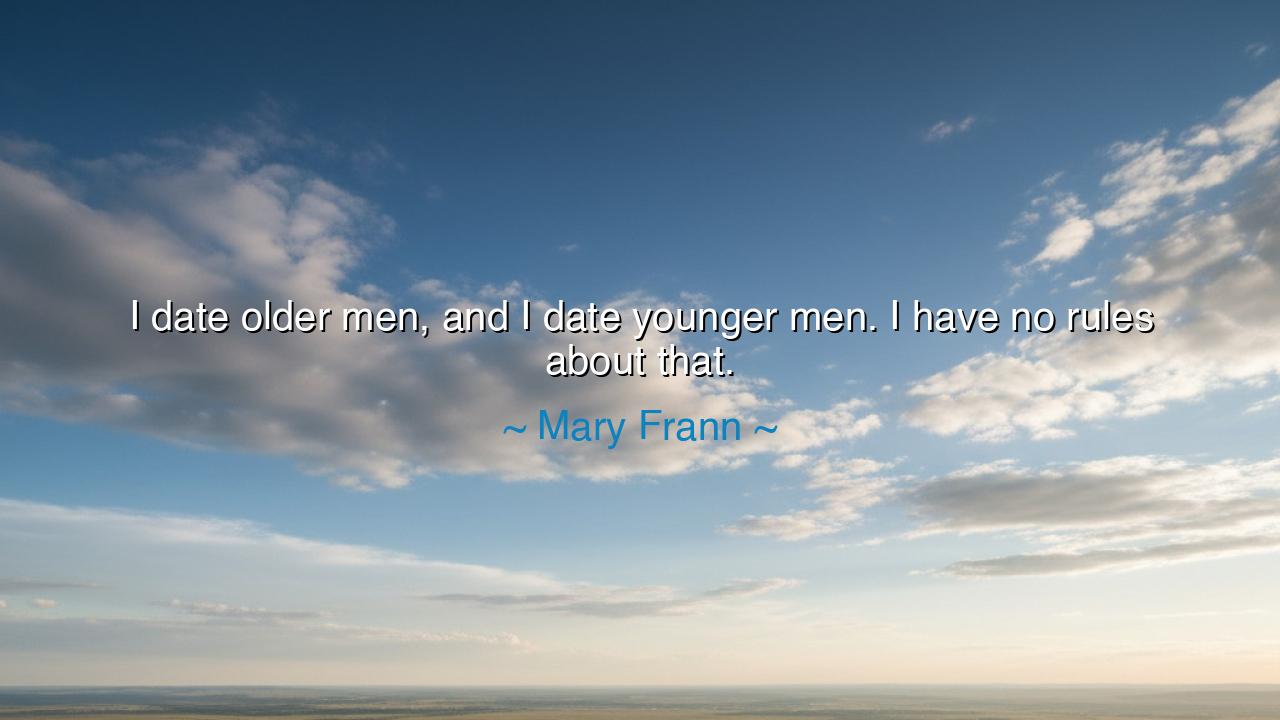
I date older men, and I date younger men. I have no rules about






In the candid and liberating words of Mary Frann, we find a declaration that speaks not merely of romance, but of the freedom of the human spirit: “I date older men, and I date younger men. I have no rules about that.” Though simple in its phrasing, this statement contains the essence of something far greater than the subject of love—it is an anthem for authenticity, for living beyond the boundaries drawn by others. It is a reminder that the heart, when guided by truth and curiosity, must not be shackled by convention.
To the ancients, such a sentiment would have been understood as the courage to follow one’s daimon—that inner spirit of purpose and desire that leads a person toward what is uniquely their own. In declaring “I have no rules,” Mary Frann speaks the language of those who live from the soul, not from the expectations of the crowd. She does not defy society for the sake of rebellion; rather, she honors the sacred wisdom that connection transcends time, that the beauty of union lies not in age or category, but in spirit and truth. The heart, after all, is not measured in years, but in depth.
Throughout history, those who have loved without fear have been both celebrated and condemned. Think of Cleopatra, whose heart moved between Julius Caesar and Mark Antony—men of power, yes, but more importantly, men who matched her intellect and fire. The world judged her, as it often does those who do not obey its rules, yet her loves changed the course of nations. Or consider George Sand, the nineteenth-century writer who defied all conventions of her time, dressing as a man, writing under a male name, and loving both older and younger partners with unashamed passion. Like Mary Frann, she lived by the creed of the sovereign heart—that to love truly is to honor what the moment demands, not what society dictates.
To say “I have no rules” is not to live carelessly, but to live consciously. It is to understand that rules without reason become cages. The wise soul, like the philosopher Diogenes, questions what others accept blindly. When it comes to love and companionship, the world often imposes its hierarchies—who should love whom, when, and how. Yet love, as the poets have taught us, is older than all human law. It arises where souls recognize one another, where laughter and silence find harmony. Mary Frann’s words are thus not an act of defiance, but of reverence—for she honors love’s infinite variety.
And still, there is humility in her statement. She does not boast of conquest or power; she merely acknowledges that she allows life to surprise her. To have “no rules” is not to reject wisdom, but to trust the unfolding of experience. It is to understand that one’s growth may come from unexpected places, from people of different ages, backgrounds, or walks of life. In this openness lies the heart’s education—the discovery that every relationship, whether fleeting or lasting, reveals a new facet of the self.
The ancients believed that wisdom often arrives through paradox: in order to know boundaries, one must first move beyond them. So too does Mary Frann teach that love cannot be confined by arithmetic, that age is but a surface measure of a soul’s rhythm. Some older hearts are young in wonder; some youthful faces carry the wisdom of centuries. When she says she dates both older and younger men, she is, in truth, saying this: I seek the living soul, not the passing shadow of time.
The lesson, then, is one of liberation. Do not let the world’s narrow rules dictate the shape of your joy. Let your heart be your compass, and your conscience your guide. Do not fear what others call strange; fear only the dullness that comes from conformity. Seek connection, not approval. In love, as in life, the measure of wisdom is not in how well one follows rules, but in how fully one embraces truth.
So, dear listener, remember the spirit of Mary Frann’s words: life is short, and love is vast. Be brave enough to meet it wherever it appears. Let no calendar or convention tell you where your heart may rest. For the soul that loves freely, guided not by rule but by reverence, walks in harmony with the eternal—unbound, unashamed, and fully alive.






AAdministratorAdministrator
Welcome, honored guests. Please leave a comment, we will respond soon